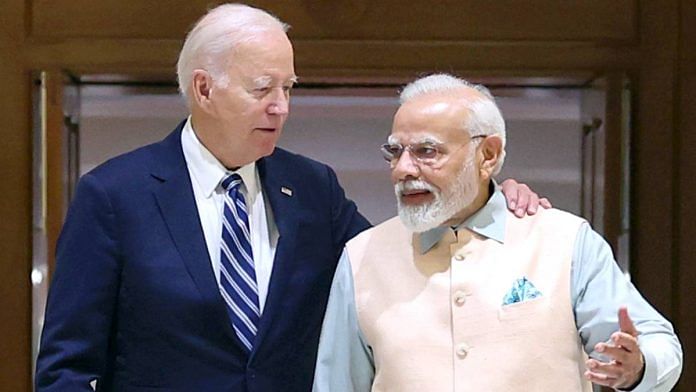Despite all its rhetoric around emerging economies, with its vaguely anti-West slant, New Delhi continues to deepen its strategic ties with the United States. There can be no better illustration of the growing intensity of a new Cold War than this deepening strategic camaraderie. The G20 is as much a venue of this competition, despite the ‘One Earth, One Family, One Future’ overcoat that India wants to paint over this reality.
The joint statement the two countries released after the meeting between Indian Prime Minister Narendra Modi and US President Joe Biden is long as usual. Despite the occasion, the Quad makes its appearance in the fourth paragraph itself. Many elements are meaningless, of course, such as US support for India’s bid for a permanent seat at the United Nations Security Council (UNSC). Any UNSC reform will require China’s support, a country that will not even let India become a member of the Nuclear Suppliers Group (NSG). So, this is a non-starter.
Moreover, an increasingly tense global political situation is not conducive to major institutional reforms such as changing membership of the UNSC. Indeed, even without the growing international tensions, reforming the UNSC would have likely proved next to impossible due to competing contestants and regional disagreement. For example, it would have been difficult for Germany to be added because there are already two European powers in the UNSC, and, of course, Italy also has its hat in the ring. China, Pakistan, and South Korea would never allow India or Japan to become members either. Nevertheless, even if meaningless, the joint statement illustrates American efforts to please New Delhi at very low costs.
Similarly, the US-India Initiative on Critical and Emerging Technologies (iCET), though relatively new, is not very easy to translate into technological cooperation on the ground. It’s more an enabling mechanism than a single programme. Still, it illustrates the desire on both sides to work on one area that New Delhi sees as particularly important, though some scepticism is warranted about what can be achieved.
Also read: After G20, India won’t get to be leader of Global South, can’t prevent new Cold War either
India has no choice this time
Nevertheless, some achievements are highlighted. The most substantive is probably on space cooperation. After initially demurring, in June 2023, India signed the US Artemis Accords. Now, the two countries have agreed to a joint mission to the International Space Station in 2024. The primary Indian international collaboration on the human spaceflight programme has, until now, been with Russia, so this represents another quite important shift in India’s space cooperation. Obviously, this does not mean that India will stop cooperating with Russia on space, but it is significant that Indian reticence about the US is overcoming one more hurdle.
Equally important is the growing defence technology and supplies cooperation between Washington and Delhi, including the sale of General Electric jet engines and the supply of long-range drones. All these efforts are aimed at directly enhancing Indian military technological capabilities against China. Though it does not appear to have made it to the joint statement, Washington and Delhi are also discussing a plan for new infrastructural links between India and Europe passing through the Middle East. This is designed to counter China’s Belt and Road Initiative (BRI) — an aspect of the new Cold War.
The simple truth is that a 21st-century Cold War cannot be avoided unless one or the other side collapses. India benefited in the last Cold War by playing both sides, but this time, there is no choice. A frontline State such as India does not have such luxuries. The deepening US-India ties is an illustration that India’s natural instinct to reprise last century’s game is increasingly failing. That India resists so hard against the natural strategic gravity cannot but raise questions about its foreign policy planning.
The author is a professor of International Politics at Jawaharlal Nehru University (JNU), New Delhi. He tweets @RRajagopalanJNU. Views are personal.
(Edited by Humra Laeeq)



